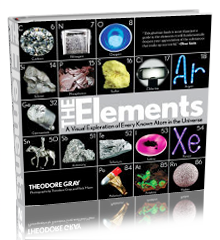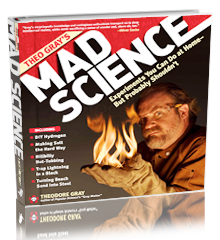Natural plutonium-containing mineral. | |||
| Sample Image | |||
| Natural plutonium-containing mineral. The sample I have representing plutonium is the naturally occurring mineral muromontite, which is a mixture of uranium and beryllium. Putting beryllium near uranium is generally considered a bad idea because the alpha particles from the decay of uranium are captured by the beryllium atoms, which in turn release neutrons. Neutrons are very unhealthy to be around. In the case of this sample, however, the neutrons are in turn re-captured by the uranium, which then undergoes further decay and is transformed into plutonium. The result is that this mineral contains the highest known naturally occurring concentration of plutonium. (Yes, no doubt some of the neutrons escape. Gillian Pearce, the source of this sample, responds "a few neutrons never hurt anyone". I'm not sure I buy this theory of the harmlessness of neutrons in small numbers, so eventually I'll get it properly measured and quantified. In the mean time, it's in the Hot Box fat lot of good that would do against fast neutrons.) If you try to look up the name "muromontite" you'll find only very spotty references. Gill explains as follows: Unfortunately you may not find muromontite for stupid bureaucratic reasons.Ah, you've got to hand it to those academics to find a way to fight about just about anything. Not that the non-academics are any better: Dozens of unusual varieties of apples in England are going extinct because the EU hasn't defined an official name for them, and people selling apples under unofficial names are prosecuted for fraud. If the variety doesn't have an EU name, it can't be sold, never mind that it's been on the market for twelve hundred years. But I digress. Considering the virtual impossibility of owning any real quantity of plutonium, this is probably the best sample I'm going get. Source: eBay seller rubbleshop Contributor: eBay seller rubbleshop Acquired: 19 October, 2002 Text Updated: 29 January, 2009 Price: Donated Size: 0.1" Purity: <1% | |||
|

